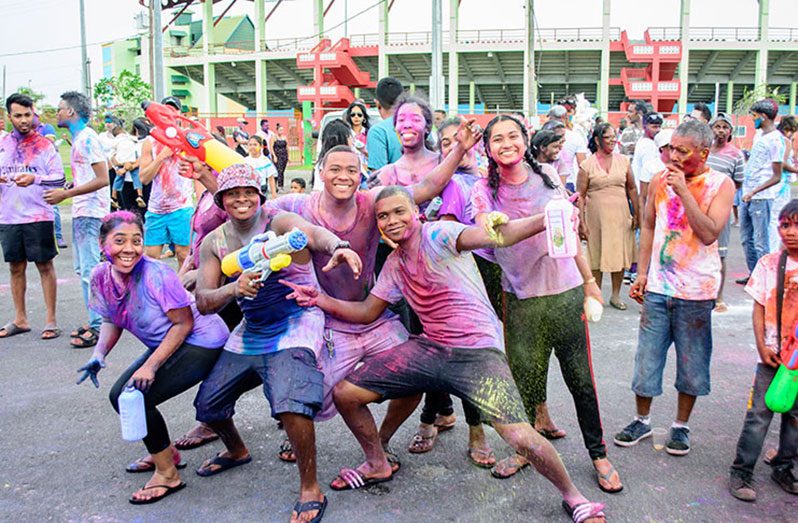REVERED as one of the most colourful, electrifying and unifying festivals of the year, Phagwah also called Holi will be a quiet affair this year due to COVID-19.
On this much-anticipated day, Guyanese of every age, race, religion and creed would have been celebrating with a kaleidoscope of colours, sweetmeats and religious ceremonies but not so this time around.
Under normal circumstances, many would have congregated at the National Stadium or at a common place to colour each other with gulal, which are coloured powders and other forms of dyes to celebrate Holi. The day would have been followed with various forms of entertainment and the sharing of sweet meats and other delightful cuisines.
PHAGWAH AND ITS MEANING
Holi, popularly known as Phagwah is the Hindu festival of colours that celebrates the triumph of good over evil, good harvest, and fertility. The festival loosens the normal social restrictions by bringing people together not based on religion, status, and/or age.
Many visit each other’s homes to distribute sweets and greet each other. Men, women, adults and children all take part in dances and other cultural programmes during Holi. People dress in pure white and gather together in a common place to colour each other with gulal, which are coloured powders and other form of dyes. A popular activity is the throwing of water-filled balloons at one another, sometimes called lola.
Holi celebrations start on Basant Panchmi which is the fifth day of the bright half of the Hindu month Omagh. On this day, in keeping with tradition, homage is done to Saraswati Devi, the goddess of knowledge and a castor oil tree is planted as a symbolic act. During a period of 40 days from Basant Panchmi to Holika Dahan, melodies of chowtaal and bhajans can be heard at Hindu temples and homes across the country.
TRIUMPH OVER EVIL
While Holi is celebrated as a spring festival, the significance of the festival derives from a story of good prevailing over evil.
Hiranyakashipu was a king in ancient India who performed extreme penances and austerities (Tapasya) until he was transformed into a good man in the eyes of the gods. The divine as a reward offered him three wishes. His first wish was that he could not be killed or die anywhere on the earth; his second wish was that neither by night or day could he die; his third wish was that he could not be killed by either man or animal. All three wishes were granted.
The king now grasped he was immortal and he was suddenly transformed into a corrupt egotist. In this fall, arrogance, greed and love for power completely consumed him. He declared he was God and compelled his subjects to attend their temples and worship him or face the pain of death if they did not. He trampled over every right the citizens had and fear and terror took over the country.
Without warning, Hiranyakashipu’s very young son, Prahalad refused to worship his father as God and declared that he would continue to worship God. The king immediately decided that Prahalad must die a painful death by being burnt alive. He, therefore, built a huge pyre and arranged with his sister Holika who could not be harmed by fire, to sit in the burning pyre and hold Prahalad in her lap until he was completely burnt to ashes. As soon as Holika and her nephew got on the pyre, it was set alight. Next morning when the citizens went to the pyre, they found that Holika was burnt to ashes and Prahalad, the playful child, quite unharmed since her power of being safe from the fire was transferred to Prahalad while he was sitting in her lap.
Hiranyakashipu was furious with anger and went to the largest temple, shouting that all must bow to him as God and as he strutted about the temple, in his rage, he slashed one of the columns with his sword and as he did so, a man-lion, Narasingha, jumped out of the column and attacked him. They began to fight and struggle until they reached the door and fell upon the steps.
At that point, Narasingha seized the king by the neck, lifted him up and strangled him. Hiranyakashipu was killed by a being who was neither man nor animal; he was killed at dusk which is neither day nor night, and he was strangled in midair and not on land. God had incarnated Himself as Narasingha to save humanity.
On the news of the death of the tyrant, the people burst out into wild rejoicing and festivities and everyone literally embraced everyone else in good fellowship and Phagwah, each year enacts the celebration of the demise of the tyrant.
CELEBRATION IN ISOLATION
This year, the celebration in Guyana will be limited to mostly celebration in the family circle and not big public celebrations as obtained in the past. During an address to the nation, on Wednesday, President, Dr. Irfaan Ali said that while there are several religious and cultural events ahead of the country over the next few weeks — including the celebration of Phagwah and Easter and the observance of Ramadan — citizens should adhere strictly to the approved COVID-19 guidelines.
“The COVID-19 Task Force has been asked to pursue charges against owners of establishments that are found in breach of the COVID-19 guidelines,” he underscored.
The task force, which incorporates members of the Joint Services, will be keenly monitoring activities on Sunday to see whether establishments are breaching these COVID-19 restrictions.
Due to the ongoing threat of COVID-19, Phagwah celebrations will be restricted. According to guidelines issued by the Ministry of Health, Phagwah events at the mandirs, including cultural programmes, chowtaal samelan and satsangh/services, are only allowed at 40 per cent capacity. These guidelines state that mandirs are encouraged to utilise their outdoor spaces where available.












